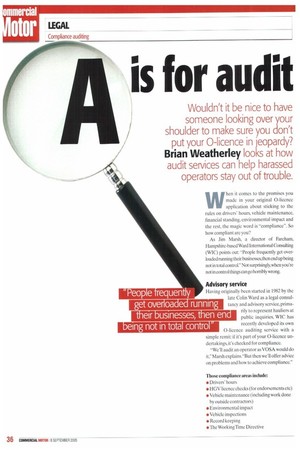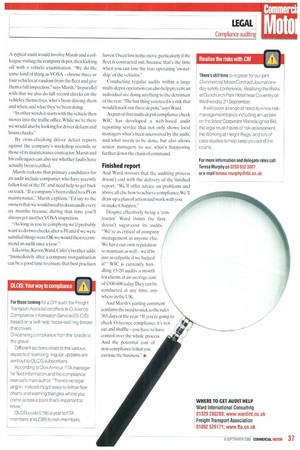is for audit
Page 36

Page 37

If you've noticed an error in this article please click here to report it so we can fix it.
Wouldn't it be nice to have someone looking over your shoulder to make sure you don't put your 0-licence in jeopardy?
Brian Weatherley looKs at how audit services can help harassed operators stay out of trouble.
When it comes to the promises you made in your original 0-licence application about sticking to the rules on drivers' hours, vehicle maintenance, financial standing, environmental impact and the rest, the magic word is "compliance". So how compliant are you?
As Jim Marsh, a director of Fareham, Hampshire-based Ward International Consulting (WIC) points out: "People frequently get overloaded running their businesses, then end up being not in total control." Not surprisingly, when you're not in control things can go horribly wrong.
Advisory service
Having originally been started in 1982 by the late Colin Ward as a legal consultancy and advisory service, primarily to represent hauliers at public inquiries, WIC has recently developed its own 0-licence auditing service with a simple remit: if it's part of your 0-licence un dertakings, it's checked for compliance.
-We'll audit an operator as VOSA would do it," Marsh explains.-But then we'll offer advice on problems and how to achieve compliance."
Those compliance areas include: • Drivers' hours • HGV licence checks (for endorsements etc) • Vehicle maintenance (including work done by outside contractors) • Environmental impact • Vehicle inspections • Record keeping • The Workinglime Directive A typical audit would involve Marsh and a colleague visiting the company depot, then kicking off with a vehicle examination. "We do the same kind of thing as VOSA — choose three or four vehicles at random from the fleet and give them a full inspection," says Marsh."In parallel with that we also do full record checks on the vehicles themselves, who's been driving them and when,and what they've been doing.
"In other words it starts with the vehicle then moves into the traffic office. While we're there we would also be looking for driver defects and hours checks."
By cross-checking driver defect reports against the company's workshop records, or those of its maintenance contractor, Marsh and his colleagues can also see whether faults have actually been rectified.
Marsh reckons that primary candidates for an audit include companies who have recently fallen foul of the TC and need help to get back on track. If a company's been called to a PI on maintenance," Marsh explains, "I'd say to the owners that we would need to do an audit every six months because during that time you'll always get another VOSA inspection.
"As long as you're complying we'd probably want to do two checks after a PI and if we were satisfied things were OK we would then recommend an audit once a year."
Likewise, Keven Ward, Cohn 's brother adds: "Immediately after a company reorganisation can be a good time to ensure that best practices haven't been lost in the move, particularly if the fleet is contracted out, because that's the time when you can lose the true operating 'ownership' of the vehicles.
Conducting regular audits within a large multi-depot operation can also help prevent an individual site doing anything to the detriment of the rest."The last thing you need is a risk that would knock out three depots," says Ward.
As part of that multi-depot compliance check WIC has developed a web-based audit reporting service that not only shows local managers what's been uncovered by the audit, and what needs to be done, but also allows senior managers to see what's happening further down the chain of command.
Finished report And Ward stresses that the auditing process doesn't end with the delivery of the finished report: "We'll offer advice on problems and above all else how to achieve compliance. We'll draw up a plan of action and work with you to make it happen."
Despite effectively being a 'contractor' Ward insists the firm doesn't sugar-coat its audits. "We're as critical of company management as anyone else. We have our own reputation to maintain as well —we'd be just as culpable if we fudged it!" WIC is currently handling 15-20 audits a month for clients at an average cost of £500-600 a day.They can be conducted at any time, anywhere in the UK.
And Marsh's parting comment confirms the need to stick to the rules 365 days of the year: "If you're going to check 0-licence compliance it's not cut and shuffle — you have to have control over the whole process. And the potential cost of non-compliance is that you can lose the business." •








































































































































































































